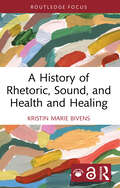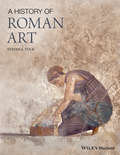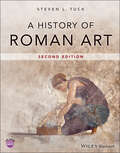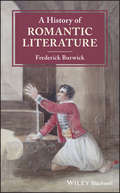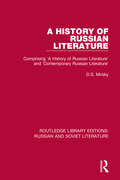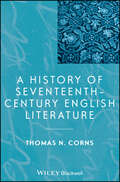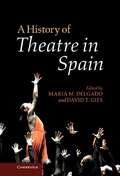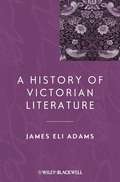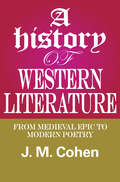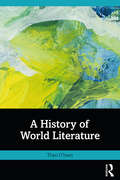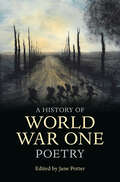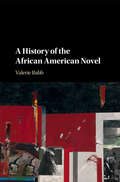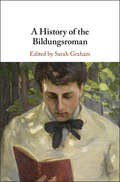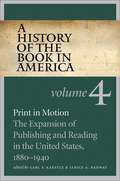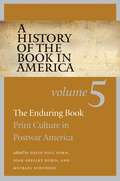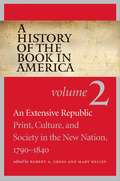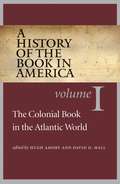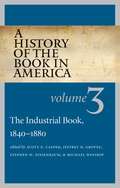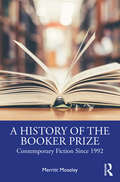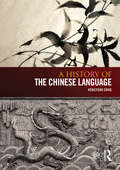- Table View
- List View
A History of Rhetoric, Sound, and Health and Healing (Routledge Studies in Rhetoric and Communication)
by Kristin Marie BivensA History of Rhetoric, Sound, and Health and Healing argues for medico-sonic knowledge — systematically interpreted bodily sounds with medical knowledge mediated by rhetoric — as an evolving corporeal practice with an incomparable, sprawling history.Taking a materialist-feminist perspective, the book rhetorically accounts for sound and suggests rhetoric enables bodily sounds as understandable, knowable, and treatable with power to help and discipline bodies in health, healing, and hospital contexts. From an expansive, pan-historiographic approach integrated with and influenced by fieldwork from neonatal intensive care units (NICUs) in Denmark and the United States, the author explores intentional and unintentional diagnostic, prognostic, and therapeutic uses of sound in contemporary Western biomedical health systems and promotes a new research concept and fieldwork practice, sound in all research.The insightful, timely volume will interest students and researchers in the medical humanities, rhetoric and communication, health communication, sound studies, medical and allied health sciences, and research methods.
A History of Roman Art
by Steven L. TuckA History of Roman Art provides a wide-ranging survey of the subject from the founding of Rome to the rule of Rome's first Christian emperor, Constantine. Incorporating the most up-to-date information available on the topic, this new textbook explores the creation, use, and meaning of art in the Roman world. Extensively illustrated with 375 color photographs and line drawings Broadly defines Roman art to include the various cultures that contributed to the Roman system Focuses throughout on the overarching themes of Rome's cultural inclusiveness and art's important role in promoting Roman values Discusses a wide range of Roman painting, mosaic, sculpture, and decorative arts, as well as architecture and associated sculptures within the cultural contexts they were created and developed Offers helpful and instructive pedagogical features for students, such as timelines; key terms defined in margins; a glossary; sidebars with key lessons and explanatory material on artistic technique, stories, and ancient authors; textboxes on art and literature, art from the provinces, and important scholarly perspectives; and primary sources in translation A book companion website is available at www.wiley.com/go/romanart with the following resources: PowerPoint slides, glossary, and timeline Steven Tuck is the 2014 recipient of the American Archaeological Association's Excellence in Undergraduate Teaching Award.
A History of Roman Art
by Steven L. TuckThe new edition of the leading textbook on Roman art, updated with new images and expanded geographic and cultural scope A History of Roman Art is an expansive survey of the painting, mosaic, sculpture, decorative arts, and architecture of ancient Rome. This acclaimed textbook provides a fully-illustrated narrative history of Roman art that spans a millennium, from the early origins of Rome to the era of Emperor Constantine. Interwoven throughout the text are themes of Rome's cultural inclusiveness and the importance of art in promoting Roman values, helping students understand how diverse cultures contributed to Roman life. Accessible, chronologically-organized chapters provide numerous examples of the arts, their cultural and historical context, descriptions of artistic techniques, and writings by ancient authors—enabling students to develop a rich appreciation of art’s importance in the Roman world. Now in its second edition, this market-leading textbook features thoroughly revised content throughout. Additional images and excerpts from literary sources are complemented by new historical discussions of metalwork, carved gems, glass, and sarcophagi. This edition features more maps and illustrations, in-depth analysis of iconography, greater emphasis on the types of objects used to decorate the lives of ordinary Romans, expanded coverage of freedmen and women as artists, subjects, and patrons, and much more. A number of works that represent popular art have been added. That is, art in the everyday Roman world, rather than just the large scale works of sculpture and architecture of elite patrons. It also reveals patterns of artistic workshops, trade, and social and economic networks. Additionally, this edition takes into account new approaches in scholarship. This comprehensive textbook: Provides a thorough introduction to Roman art history featuring more than 400 high quality images and illustrations Includes a full set of pedagogical tools, such as historical timelines, key term definitions, and updated references and further reading suggestions Offers “Scholarly Perspective,” “A View from the Provinces,” “More on Myth,” and “Art and Literature” textboxes in each chapter Includes a companion website containing PowerPoint slides and additional instructor resources A History of Roman Art, Second Edition is an ideal primary o
A History of Romantic Literature (Blackwell History of Literature)
by Frederick BurwickHistorical Narrative Offers Introduction to Romanticism by Placing Key Figures in Overall Social Context Going beyond the general literary survey, A History of Romantic Literature examines the literatures of sensibility and intensity as well as the aesthetic dimensions of horror and terror, sublimity and ecstasy, by providing a richly integrated account of shared themes, interests, innovations, rivalries and disputes among the writers of the late eighteenth and early nineteenth centuries. Drawing from the assemblage theory, Prof. Burwick maintains that the literature of the period is inseparable from prevailing economic conditions and ongoing political and religious turmoil, as well as developments in physics, astronomy, music and art. Thus, rather than deal with authors as if they worked in isolation from society, he identifies and describes their interactions with their communities and with one another, as well as their responses to current events. By connecting seemingly scattered and random events such as the bank crisis of 1825, he weaves the coincidental into a coherent narrative of the networking that informed the rise and progress of Romanticism. Notable features of the book include: A strong narrative structure divided into four major chronological periods: Revolution, 1789-1798; Napoleonic Wars, 1799-1815; Riots, 1815-1820; Reform, 1821-1832 Thorough coverage of major and minor figures and institutions of the Romantic movement (including Mary Wollstonecraft, Elizabeth Montague and the Bluestockings, Lord Byron, John Keats, Letitia Elizabeth Landon etc.) Emphasis on the influence of social networks among authors, such as informal dinners and teas, clubs, salons and more formal institutions With its extensive coverage and insightful analysis set within a lively historical narrative, History of Romantic Literature is highly recommended for courses on British Romanticism at both undergraduate and post-graduate levels. It will also prove a highly useful reference for advanced scholars pursuing their own research.
A History of Russian Literature: Comprising 'A History of Russian Literature' and 'Contemporary Russian Literature' (Routledge Library Editions: Russian and Soviet Literature #6)
by D.S. MirskyThis book, first published in 1949, is an abridged version of Mirsky’s classic two texts on Russian literature, updated with a postscript by the editor assessing the development of Soviet literature. Beautifully written, Mirsky’s analyses of Russian writers and literature go hand in hand with his takes on Russian history. From the birth of Russian literature to its Soviet form, this book is a lively and comprehensive examination by one of its leading scholars.
A History of Seventeenth-Century English Literature (Blackwell History of Literature #1)
by Thomas N. CornsA History of Seventeenth-Century Literature outlines significant developments in the English literary tradition between the years 1603 and 1690. An energetic and provocative history of English literature from 1603-1690. Part of the major Blackwell History of English Literature series. Locates seventeenth-century English literature in its social and cultural contexts. Considers the physical conditions of literary production and consumption. Looks at the complex political, religious, cultural and social pressures on seventeenth-century writers. Features close critical engagement with major authors and texts Thomas Corns is a major international authority on Milton, the Caroline Court, and the political literature of the English Civil War and the Interregnum.
A History of Theatre in Spain
by Maria M. Delgado David T. GiesLeading theater historians and practitioners map a theatrical history that moves from the religious tropes of Medieval Iberia to the postmodern practices of twenty-first-century Spain. Considering work across the different languages of Spain, from vernacular Latin to Catalan, Galician and Basque, this history engages with the work of actors and directors, designers and publishers, agents and impresarios, and architects and ensembles, in indicating the ways in which theater has both commented on and intervened in the major debates and issues of the day. Chapters consider paratheatrical activities and popular performance, such as the comedia de magia and flamenco, alongside the works of Spain's major dramatists, from Lope de Vega to Federico García Lorca. Featuring revealing interviews with actress Nuria Espert, director Lluís Pasqual and playwright Juan Mayorga, it positions Spanish theater within a paradigm that recognizes its links and intersections with wider European and Latin American practices.
A History of Twentieth-Century American Women’s Poetry
by Linda A. KinnahanA History of Twentieth-Century American Women's Poetry explores the genealogy of modern American verse by women from the early twentieth century to the millennium. Beginning with an extensive introduction that charts important theoretical contributions to the field, this History includes wide-ranging essays that illuminate the legacy of American women poets. Organized thematically, these essays survey the multilayered verse of such diverse poets as Edna St Vincent Millay, Marianne Moore, Anne Sexton, Adrienne Rich, and Audre Lorde. Written by a host of leading scholars, this History also devotes special attention to the lasting significance of feminist literary criticism. This book is of pivotal importance to the development of women's poetry in America and will serve as an invaluable reference for specialists and students alike.
A History of Urdu Literature
by Ali Jawad ZaidiThis work presents a compact survey of the rich and varied contribution of Urdu to the Indian literary mainstream through centuries of shared creative inspiration.
A History of Victorian Literature (Blackwell History of Literature #11)
by James Eli AdamsIncorporating a broad range of contemporary scholarship, A History of Victorian Literature presents an overview of the literature produced in Great Britain between 1830 and 1900, with fresh consideration of both major figures and some of the era's less familiar authors. Part of the Blackwell Histories of Literature series, the book describes the development of the Victorian literary movement and places it within its cultural, social and political context. A wide-ranging narrative overview of literature in Great Britain between 1830 and 1900, capturing the extraordinary variety of literary output produced during this era Analyzes the development of all literary forms during this period - the novel, poetry, drama, autobiography and critical prose - in conjunction with major developments in social and intellectual history Considers the ways in which writers engaged with new forms of social responsibility in their work, as Britain transformed into the world's first industrial economy Offers a fresh perspective on the work of both major figures and some of the era’s less familiar authors Winner of a Choice Outstanding Academic Title award, 2009
A History of Virginia Literature
by Kevin J. HayesA History of Virginia Literature chronicles a story that has been more than four hundred years in the making. It looks at the development of literary culture in Virginia from the founding of Jamestown in 1607 to the twenty-first century. Divided into four main parts, this History examines the literature of colonial Virginia, Jeffersonian Virginia, Civil War Virginia, and modern Virginia. Individual chapters survey such literary genres as diaries, histories, letters, novels, poetry, political writings, promotion literature, science fiction, and slave narratives. Leading scholars also devote special attention to several major authors, including William Byrd of Westover, Thomas Jefferson, Ellen Glasgow, Edgar Allan Poe, and William Styron. This book is of pivotal importance to the development of American literature and of American studies more generally.
A History of Western American Literature
by Susan KollinThe American West is a complex region that has inspired generations of writers and artists. Often portrayed as a quintessential landscape that symbolizes promise and progress for a developing nation, the American West is also a diverse space that has experienced conflicting and competing hopes and expectations. While it is frequently imagined as a place enabling dreams of new beginnings for settler communities, it is likewise home to long-standing indigenous populations as well as many other ethnic and racial groups who have often produced different visions of the land. This History encompasses the intricacy of Western American literature by exploring myriad genres and cultural movements, from ecocriticism, settler colonial studies and transnational theory, to race, ethnic, gender and sexuality studies. Written by a host of leading historians and literary critics, this book offers readers insight into the West as a site that sustains canonical and emerging authors alike, and as a region that exceeds national boundaries in addressing long-standing global concerns and developments.
A History of Western Literature: From Medieval Epic to Modern Poetry
by G. MitchellThis book begins in a narrow territory, strictly Western, and extends with the passage of time to include the poetry, plays, novels, and works of speculation of the great authors of the past and present, from Russia to Mexico. His objective is to tell the whole story of Western writing in languages other than English from the twelfth-century Chanson de Roland to Evtushenko's poetry of the 1960's.Cohen not only presents a factual account of historical growth. The book reflects the author's own judgments and valuations, arrived at in the course of almost forty years' reading in the main European languages. A work of original criticism, "A History of Western Literature" immediately became a standard reference when first published. In this new edition, the author has included revisions covering the most important recent writers and their work.
A History of World Literature
by Theo D'haenA History of World Literature is a fully revised and expanded edition of The Routledge Concise History of World Literature (2012). This remarkably broad and informative book offers an introduction to “world literature.”Tracing the term from its earliest roots and situating it within a number of relevant contexts from postcolonialism, decoloniality, ecocriticism, and book circulation, Theo D’haen in ten tightly-argued but richly-detailed chapters examines: the return of the term “world literature” and its changing meaning; Goethe’s concept of Weltliteratur and how this relates to current debates; theories and theorists who have had an impact on world literature; and how world literature is taught around the world. By examining how world literature is studied around the globe, this book is the ideal guide to an increasingly popular and important term in literary studies. It is accessible and engaging and will be invaluable to students of world literature, comparative literature, translation, postcolonial and decoloniality studies, and materialist approaches, and to anyone with an interest in these or related topics.
A History of World War One Poetry
by Jane PotterSituating First World War poetry in a truly global context, this book reaches beyond the British soldier-poet canon. A History of World War One Poetry examines popular and literary, ephemeral and enduring poems that the cataclysm of 1914-1918 inspired. Across Europe, poets wrestled with the same problem: how to represent a global conflict, dominated by modern technology, involving millions of combatants and countless civilians. For literary scholars this has meant discovering and engaging with the work of men and women writing in other languages, on other fronts, and from different national perspectives. Poems are presented in their original languages and in English translations, some for the very first time, while a Coda reflects on the study and significance of First World War poetry in the wake of the Centenary. A History of World War One Poetry offers a new perspective on the literary and human experience of 1914-1918.
A History of the African American Novel
by Valerie BabbA History of the African American Novel offers an in-depth overview of the development of the novel and its major genres. In the first part of this book, Valerie Babb examines the evolution of the novel from the 1850s to the present, showing how the concept of black identity has transformed along with the art form. The second part of this History explores the prominent genres of African American novels, such as neoslave narratives, detective fiction, and speculative fiction, and considers how each one reflects changing understandings of blackness. This book builds on other literary histories by including early black print culture, African American graphic novels, pulp fiction, and the history of adaptation of black novels to film. By placing novels in conversation with other documents - early black newspapers and magazines, film, and authorial correspondence - A History of the African American Novel brings many voices to the table to broaden interpretations of the novel's development.
A History of the Bildungsroman
by Sarah GrahamThe Bildungsroman has been one of the most significant genres in Western literature since the eighteenth century. This volume, comprised of eleven chapters by leading experts in the field, offers original insights into how the novel of formation developed a strong tradition in Germany, France, Britain, Russia, and the USA. In demonstrating how the genre has been adopted and adapted in innovative forms of fiction, this volume also shows how a genre traditionally associated with the young white man has been used to give expression to the formative experiences of women, LGBTQ people, and post-colonial populations. Exploring the genre's emergence and evolution in numerous countries and across more than two hundred years, this volume provides unprecedented historical and geographical coverage and demonstrates that the Bildungsroman has a rich heritage and a bright future.
A History of the Book in America
by Janice A. Radway Carl F. KaestleIn a period characterized by expanding markets, national consolidation, and social upheaval, print culture picked up momentum as the nineteenth century turned into the twentieth. Books, magazines, and newspapers were produced more quickly and more cheaply, reaching ever-increasing numbers of readers. Volume 4 of A History of the Book in America traces the complex, even contradictory consequences of these changes in the production, circulation, and use of print. Contributors to this volume explain that although mass production encouraged consolidation and standardization, readers increasingly adapted print to serve their own purposes, allowing for increased diversity in the midst of concentration and integration. Considering the book in larger social and cultural networks, essays address the rise of consumer culture, the extension of literacy and reading through schooling, the expansion of secondary and postsecondary education and the growth of the textbook industry, the growing influence of the professions and their dependence on print culture, and the history of relevant technology. As the essays here attest, the expansion of print culture between 1880 and 1940 enabled it to become part of Americans' everyday business, social, political, and religious lives. Contributors:Megan Benton, Pacific Lutheran UniversityPaul S. Boyer, University of Wisconsin-MadisonUna M. Cadegan, University of DaytonPhyllis Dain, Columbia UniversityJames P. Danky, University of Wisconsin-MadisonEllen Gruber Garvey, New Jersey City UniversityPeter Jaszi, American UniversityCarl F. Kaestle, Brown UniversityNicolas Kanellos, University of HoustonRichard L. Kaplan, ABC-Clio PublishingMarcel Chotkowski LaFollette, Washington, D.C.Elizabeth Long, Rice UniversityElizabeth McHenry, New York UniversitySally M. Miller, University of the PacificRichard Ohmann, Wesleyan UniversityJanice A. Radway, Duke UniversityJoan Shelley Rubin, University of RochesterJonathan D. Sarna, Brandeis UniversityCharles A. Seavey, University of Missouri, ColumbiaMichael Schudson, University of California, San DiegoWilliam Vance Trollinger Jr., University of DaytonRichard L. Venezky (1938-2004)James L. W. West III, Pennsylvania State UniversityWayne A. Wiegand, Florida State UniversityMichael Winship, University of Texas at AustinMartha Woodmansee, Case Western Reserve UniversityThe contributors are Megan Benton, Paul S. Boyer, Una M. Cadegan, Phyllis Dain, James P. Danky, Ellen Gruber Garvey, Peter Jaszi, Carl F. Kaestle, Nicolas Kanellos, Richard L. Kaplan, Marcel Chotkowski LaFollette, Elizabeth Long, Elizabeth McHenry, Sally M. Miller, Richard Ohmann, Janice A. Radway, Joan Shelley Rubin, Jonathan D. Sarna, Charles A. Seavey, Michael Schudson, William Vance Trollinger Jr., Richard L. Venezky, James L. W. West III, Wayne A. Wiegand, Michael Winship, and Martha Woodmansee.-->
A History of the Book in America
by Michael Schudson Joan Shelley Rubin David Paul NordThe fifth volume of A History of the Book in America addresses the economic, social, and cultural shifts affecting print culture from World War II to the present. During this period factors such as the expansion of government, the growth of higher education, the climate of the Cold War, globalization, and the development of multimedia and digital technologies influenced the patterns of consolidation and diversification established earlier.The thirty-three contributors to the volume explore the evolution of the publishing industry and the business of bookselling. The histories of government publishing, law and policy, the periodical press, literary criticism, and reading--in settings such as schools, libraries, book clubs, self-help programs, and collectors' societies--receive imaginative scrutiny as well. The Enduring Book demonstrates that the corporate consolidations of the last half-century have left space for the independent publisher, that multiplicity continues to define American print culture, and that even in the digital age, the book endures.Contributors:David Abrahamson, Northwestern UniversityJames L. Baughman, University of Wisconsin-MadisonKenneth Cmiel (d. 2006)James Danky, University of Wisconsin-MadisonRobert DeMaria Jr., Vassar CollegeDonald A. Downs, University of Wisconsin-MadisonRobert W. Frase (d. 2003)Paul C. Gutjahr, Indiana UniversityDavid D. Hall, Harvard Divinity SchoolJohn B. Hench, American Antiquarian SocietyPatrick Henry, New York City College of TechnologyDan Lacy (d. 2001)Marshall Leaffer, Indiana UniversityBruce Lewenstein, Cornell UniversityElizabeth Long, Rice UniversityBeth Luey, Arizona State UniversityTom McCarthy, Beirut, LebanonLaura J. Miller, Brandeis UniversityPriscilla Coit Murphy, Chapel Hill, N.C.David Paul Nord, Indiana UniversityCarol Polsgrove, Indiana UniversityDavid Reinking, Clemson UniversityJane Rhodes, Macalester CollegeJohn V. Richardson Jr., University of California, Los AngelesJoan Shelley Rubin, University of RochesterMichael Schudson, University of California, San Diego, and Columbia UniversityLinda Scott, University of OxfordDan Simon, Seven Stories PressIlan Stavans, Amherst CollegeHarvey M. Teres, Syracuse UniversityJohn B. Thompson, University of CambridgeTrysh Travis, University of FloridaJonathan Zimmerman, New York University
A History of the Book in America
by Robert A. Gross Mary KelleyVolume Two of A History of the Book in America documents the development of a distinctive culture of print in the new American republic.Between 1790 and 1840 printing and publishing expanded, and literate publics provided a ready market for novels, almanacs, newspapers, tracts, and periodicals. Government, business, and reform drove the dissemination of print. Through laws and subsidies, state and federal authorities promoted an informed citizenry. Entrepreneurs responded to rising demand by investing in new technologies and altering the conduct of publishing. Voluntary societies launched libraries, lyceums, and schools, and relied on print to spread religion, redeem morals, and advance benevolent goals. Out of all this ferment emerged new and diverse communities of citizens linked together in a decentralized print culture where citizenship meant literacy and print meant power. Yet in a diverse and far-flung nation, regional differences persisted, and older forms of oral and handwritten communication offered alternatives to print. The early republic was a world of mixed media.Contributors: Elizabeth Barnes, College of William and MaryGeorgia B. Barnhill, American Antiquarian SocietyJohn L. Brooke, The Ohio State UniversityDona Brown, University of VermontRichard D. Brown, University of ConnecticutKenneth E. Carpenter, Harvard University LibrariesScott E. Casper, University of Nevada, RenoMary Kupiec Cayton, Miami UniversityJoanne Dobson, Brewster, New YorkJames N. Green, Library Company of PhiladelphiaDean Grodzins, Massachusetts Historical SocietyRobert A. Gross, University of ConnecticutGrey Gundaker, College of William and MaryLeon Jackson, University of South CarolinaRichard R. John, Columbia UniversityMary Kelley, University of MichiganJack Larkin, Clark UniversityDavid Leverenz, University of FloridaMeredith L. McGill, Rutgers UniversityCharles Monaghan, Charlottesville, VirginiaE. Jennifer Monaghan, Brooklyn College of The City University of New YorkGerald F. Moran, University of Michigan-DearbornKaren Nipps, Harvard UniversityDavid Paul Nord, Indiana UniversityBarry O'Connell, Amherst CollegeJeffrey L. Pasley, University of Missouri-ColumbiaWilliam S. Pretzer, Central Michigan UniversityA. Gregg Roeber, Pennsylvania State UniversityDavid S. Shields, University of South CarolinaAndie Tucher, Columbia UniversityMaris A. Vinovskis, University of MichiganSandra A. Zagarell, Oberlin College
A History of the Book in America, 5-volume Omnibus E-book
by David D. HallThe five volumes in A History of the Book in America offer a sweeping chronicle of our country's print production and culture from colonial times to the end of the twentieth century. This interdisciplinary, collaborative work of scholarship examines the book trades as they have developed and spread throughout the United States; provides a history of U.S. literary cultures; investigates the practice of reading and, more broadly, the uses of literacy; and links literary culture with larger themes in American history.Now available for the first time, this complete Omnibus ebook contains all 5 volumes of this landmark work.Volume 1The Colonial Book in the Atlantic WorldEdited by Hugh Amory and David D. Hall664 pp., 51 illus.Volume 2An Extensive Republic: Print, Culture, and Society in the New Nation, 1790-1840Edited by Robert A. Gross and Mary Kelley712 pp., 66 illus.Volume 3The Industrial Book, 1840-1880Edited by Scott E. Casper, Jeffrey D. Groves, Stephen W. Nissenbaum, and Michael Winship560 pp., 43 illus.Volume 4Print in Motion: The Expansion of Publishing and Reading in the United States, 1880-1940Edited by Carl F. Kaestle and Janice A. Radway688 pp., 74 illus.Volume 5The Enduring Book: Print Culture in Postwar AmericaEdited by David Paul Nord, Joan Shelley Rubin, and Michael Schudson632 pp., 95 illus.
A History of the Book in America- Volume 3
by David D. Hall Hugh AmoryThe Colonial Book in the Atlantic World carries the interrelated stories of publishing, writing, and reading from the beginning of the colonial period in America up to 1790. Three major themes run through the volume: the persisting connections between the book trade in the Old World and the New, evidenced in modes of intellectual and cultural exchange and the dominance of imported, chiefly English books; the gradual emergence of a competitive book trade in which newspapers were the largest form of production; and the institution of a "culture of the Word," organized around an essentially theological understanding of print, authorship, and reading, complemented by other frameworks of meaning that included the culture of republicanism. The Colonial Book in the Atlantic World also traces the histories of literary and learned culture, censorship and "freedom of the press," and literacy and orality.Contributors:Hugh AmoryRoss W. Beales, The College of the Holy CrossJohn Bidwell, Princeton University LibraryRichard D. Brown, University of ConnecticutCharles E. Clark, University of New HampshireJames N. Green, Library Company of PhiladelphiaDavid D. Hall, Harvard Divinity SchoolRussell L. Martin, Southern Methodist UniversityE. Jennifer Monaghan, Brooklyn College of The City University of New YorkJames Raven, University of EssexElizabeth Carroll Reilly, Hardwick, MassachusettsA. Gregg Roeber, Pennsylvania State UniversityDavid S. Shields, University of South CarolinaCalhoun Winton, University of Maryland
A History of the Book in America- Volume 5
by Michael Winship Stephen W. Nissenbaum Jeffrey D. Groves Scott E. CasperVolume 3 of A History of the Book in America narrates the emergence of a national book trade in the nineteenth century, as changes in manufacturing, distribution, and publishing conditioned, and were conditioned by, the evolving practices of authors and readers. Chapters trace the ascent of the "industrial book--a manufactured product arising from the gradual adoption of new printing, binding, and illustration technologies and encompassing the profusion of nineteenth-century printed materials--which relied on nationwide networks of financing, transportation, and communication. In tandem with increasing educational opportunities and rising literacy rates, the industrial book encouraged new sites of reading; gave voice to diverse communities of interest through periodicals, broadsides, pamphlets, and other printed forms; and played a vital role in the development of American culture.Contributors:Susan Belasco, University of NebraskaCandy Gunther Brown, Indiana UniversityKenneth E. Carpenter, Newton Center, MassachusettsScott E. Casper, University of Nevada, RenoJeannine Marie DeLombard, University of TorontoAnn Fabian, Rutgers UniversityJeffrey D. Groves, Harvey Mudd CollegePaul C. Gutjahr, Indiana UniversityDavid D. Hall, Harvard Divinity SchoolDavid M. Henkin, University of California, BerkeleyBruce Laurie, University of Massachusetts, AmherstEric Lupfer, Humanities TexasMeredith L. McGill, Rutgers UniversityJohn Nerone, University of IllinoisStephen W. Nissenbaum, University of MassachusettsLloyd Pratt, Michigan State UniversityBarbara Sicherman, Trinity CollegeLouise Stevenson, Franklin & Marshall CollegeAmy M. Thomas, Montana State UniversityTamara Plakins Thornton, State University of New York, BuffaloSusan S. Williams, Ohio State UniversityMichael Winship, University of Texas at Austin
A History of the Booker Prize: Contemporary Fiction Since 1992
by Merritt MoseleyIn this book, Merritt Moseley offers a brief history of the Booker Prize since 1992. With a short chapter covering each year, we follow the change in criteria, the highs and lows, short lists, winners, and controversies of the Booker Prize. The book also functions as an example of literary criticism for each of the books involved, analyzing the judging process and the winning books. Exploring themes such as literary vs. popular fiction, the role of Postcolonial work in what began as a very "British" prize, the role of marketing, publishing, and the Booker organization itself, the book offers a crucial view into literary prize culture. The book spends time looking at exclusions, as well as the overall role and function of the literary prize. What books aren’t included and why? Why has the Booker become so significant? This book will be of use to anyone with an interest in, or studying, contemporary literature, literary prizes, literary culture and British literature, as well as publishing studies.
A History of the Chinese Language
by Hongyuan DongA History of the Chinese Language provides a comprehensive introduction to the historical development of the Chinese language from its proto Sino-Tibetan roots in prehistoric times to Modern Standard Chinese. Taking a highly accessible and balanced approach, it presents a chronological survey of the various stages of Chinese language development, covering crucial aspects such as phonology, syntax and semantics. Features include: Coverage of the key historical stages in Chinese language development, such as Old Chinese, Middle Chinese, Early Modern Chinese, Classical Chinese and Modern Standard Chinese Treatment of core linguistic aspects of the Chinese language including phonological changes, grammatical development, lexical evolution, vernacular writing, Chinese characters and Modern Chinese dialects Inclusion of many authentic Chinese legends and texts throughout the book, presented through a rigorous framework of linguistic analysis to help students to build up strong critical and evaluative skills and acquire valuable cultural knowledge Integration of materials from different disciplines, such as archaeology, anthropology, history and sociolinguistics, to highlight the cultural and social background of each period of the language Helpful appendices to aid students with no prior knowledge of linguistics or the Chinese language Companion website at www.routledge.com/cw/dong offering a wealth of supplementary resources such as additional exercises, answer keys and audio recordings of the sounds of Middle and Old Chinese. Written by a highly experienced instructor, A History of the Chinese Language will be an essential resource for beginning students of Chinese Language and Linguistics and for anyone interested in the history and culture of China.
